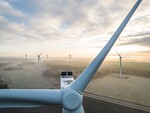ScottishPower Renewables to trial new Aveillant radar solution to ‘unlock’ the future of offshore wind
Rapid growth in offshore wind technology means that much larger and more powerful wind turbines are set to be installed in the waters around the UK in the coming years. This accelerated growth has seen the UK take a global lead in offshore wind as costs have been cut and a strong supply chain has been established.
Now with ‘next generation’ offshore projects considering wind turbines with tip heights upwards of 250 metres, it is a recognised by the renewable energy industry that these projects could interfere with Ministry of Defence (MoD) radar coverage and civilian aviation radar.
Larger blades and taller structures can cause ‘clutter’ and ‘shadowing’ with existing radar technology. It is estimated that as much as 10 gigawatts (GW) of projects currently in planning are at risk of MoD objections, with future projects beyond this also at risk.
Currently ‘rotating radar’ is the predominant technology used in the UK today. This technology is unable to easily distinguish between moving turbine blades and other objects such as drones and aircraft. Rotating radars lose sight of the ‘target’ on each rotation, and have to reacquire the ‘target’ each time.
ScottishPower Renewables has been working with Aveillant to find a solution that will satisfy MoD concerns, and an agreement was signed on 18th July at the Farnborough Air Show to develop a pioneering new system.
Aveillant Holographic Radar is a non-rotating, two-dimensional ‘staring’ array which produces a full three-dimensional picture of the covered volume of airspace. The system uses powerful alg3orithms to recognise what it sees (wind turbines, aircraft and, in other applications, drones) and provides a ‘clutter-free’ picture to the radar operator. Holographic Radar spends 100% ‘time on target’ - continuously and simultaneously monitoring all the airspace it can see.
It is proposed that an extended range Aveillant radar will be tested in Northamptonshire within the next 9 months, and the results will be shared with the MoD. Further tests on the east coast of England will be planned soon after. If successful, the technology could be applied to future offshore wind projects in the UK, with global export opportunities to other countries around the world with offshore wind ambitions. The agreement with Aveillant will see the creation of a number of new highly skilled engineering jobs in Cambridge.
Jonathan Cole, Managing Director of Offshore Wind at ScottishPower Renewables, said: “Offshore wind has grown so quickly, and technology has advanced so far, that we are encountering issues now that were not anticipated to be a problem for many years. It is very important that we work closely with the MoD and other aviation bodies to ensure that the UK’s global lead in the offshore wind industry is maintained, and the Government’s carbon reduction plans can be achieved.
“The Aveillant technology is unique, and we are confident that the trial will lead to a system that satisfies the MoD’s concerns. Our industry has continually shown it is capable of innovating to meet the challenges we have been set, and radar is the next big issue that we need to address.”
Dr Dominic Walker, Chief Executive Officer at Aveillant said: “The Aveillant Holographic Radar technology provides a new solution to a very important problem, and could ultimately have a direct impact on the amount of offshore wind power produced in the UK. It is great to see a real commitment to innovation from leaders in the industry such as ScottishPower Renewables. We’re delighted to be working on this project”
- Source:
- ScottishPower Renewables
- Author:
- Press Office
- Link:
- www.scottishpowerrenewables.com/...
- Keywords:
- ScottishPower renewables, Aveillant, radar, offshore, wind turbines, flight, 3D, drones, aircraft


























